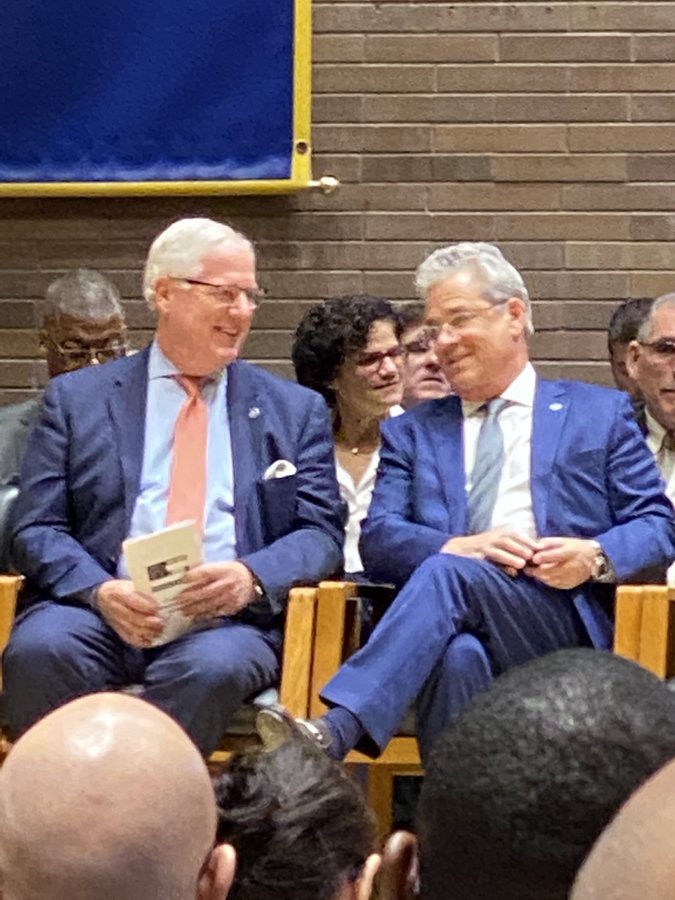
The Intercept published a story that landed Reality Winner in prison, burning its third source. That article was co-authored by Richard Esposito, an embedded police reporter who is now the NYPD’s top spokesperson.
By Ben Norton
A co-author of a controversial report at The Intercept that landed its source in prison now works as the head of the New York Police Department’s press office.
The former journalist, Richard Esposito, had embedded for a long period inside the NYPD, developing close ties to US police agencies that were clear before The Intercept chose to work with him. However, the news website apparently did not see Esposito’s cop-friendly behavior as disqualifying or even suspicious.
Esposito and his longtime friend and colleague, Matthew Cole, a full-time reporter at The Intercept, were co-authors of a 2017 report on National Security Agency allegations of Russian meddling in the 2016 US presidential election. The reporters disclosed sensitive information to US government agencies, which led to the outing of their confidential source, former NSA contractor Reality Winner, and her eventual imprisonment for five years.
Although this scandalous story was the only piece Esposito published at The Intercept, he was somehow assigned an official company email address as well as an author page that has since been removed from the website without explanation.
The same duo, Esposito and Cole, played an integral role in the arrest and imprisonment of another source, CIA whistleblower John Kiriakou, several years before they worked with The Intercept.

The Intercept’s record of burning sources extends well beyond Reality Winner. In 2018, former FBI agent Terry Albury was sentenced to four years in prison, after he leaked documents to the news website exposing the police agency’s widespread racism and anti-Muslim surveillance practices. One of the co-authors of the reports exposing the FBI, Cora Currier, remains an editor at The Intercept. The other co-author, Jenna McLaughlin, went on to work with CNN, Foreign Policy, and Yahoo News.
Next, in 2019, former NSA official Daniel Hale was indicted by a grand jury for allegedly leaking documents, also apparently to The Intercept. He faces up to 50 years in prison.
The troubling pattern raises serious questions about why sources of The Intercept, Richard Esposito, and Matthew Cole keep getting burned. Is it mere carelessness on the part of the reporters, or have US government agencies played a role?
Serious question for The Intercept: Do you secretly work for the FBI? David Hale, Reality Winner and Terry Albury are all in prison because of you. Is it incompetence or are you compromised? You owe a lot of people an explanation. And an apology.
933 people are talking about this
The Intercept, which is owned and financed by billionaire eBay founder Pierre Omidyar, was heavily criticized for its handling of the Edward Snowden leaks. The website shut down access to the renowned whistleblower’s trove of NSA documents under suspicious circumstances, after publishing just a small fraction of them. Omidyar, a Big Tech oligarch with extensive links to US government-backed regime-change networks, appears to have effectively privatized Snowden’s leaks, the vast majority of which will never see the light of day.
Omidyar’s own views do not exactly match those of a radical civil libertarian. In 2009, the billionaire tweeted that the technology news website “TechCrunch and anybody else who pubs stolen info should help catch the thief. Shldnt pub in the 1st place.” WikiLeaks and other transparency organizations have taken notice.
Pierre Omidyar in 2009: “Anybody who publishes stolen info should help catch the thief” pando.com/2013/12/07/pie…
49 people are talking about this
US government intelligence agencies have also found utility in The Intercept’s reporting. Back in 2017, none other than CIA Director Mike Pompeo cited The Intercept, quoting an article by its reporter Sam Biddle, in his withering attack on WikiLeaks and its now imprisoned publisher Julian Assange.
In a speech at the hawkish think tank the Center for Strategic and International Studies (CSIS), Pompeo twice quoted The Intercept’s Biddle to portray WikiLeaks as unreliable and downplay the importance of its publications.

Biddle is another co-author of The Intercept article that resulted in Reality Winner’s imprisonment.
His former colleague’s transition from journalist to the head of PR for the NYPD brings up further concerns about The Intercept, its editorial judgement, and the relationships some of its contributors nurtured with US police agencies.
Burning source Reality Winner, landing her in prison
On June 5, 2017, The Intercept published a top-secret document leaked from the National Security Agency, which claimed that Russia’s military intelligence services attempted to meddle in the November 2016 US election through alleged hacking and phishing.
The article, which critics argued was over-hyped and lacked firm evidence, was co-authored by Richard Esposito and three full-time The Intercept staffers: Matthew Cole, Sam Biddle, and Ryan Grim.
Mere minutes after the news website released the story, the US Department of Justice announced that it had arrested the alleged leaker two days before publication. It identified her as an intelligence specialist and NSA contractor named Reality Leigh Winner.
Due to the carelessness of The Intercept, the FBI was easily able to prove the document came from Winner’s work computer, which she had used to directly communicate with the journalists. Winner pleaded guilty; in August 2018, she was sentenced to more than five years in prison.
Security experts and journalists harshly criticized The Intercept for its sloppiness and failure to take basic measures to protect its source. It turned out that a reporter working with the website had contacted both an NSA contractor and the NSA itself in hopes of confirming the authenticity of the leaked document. The journalist recklessly disclosed critical information that federal law enforcement immediately used to identify Winner, including her city of residence, the intelligence report number, and a physical printout of the document with microdot metadata information that identified its origin.
In outrage at The Intercept’s negligence, WikiLeaks offered a $10,000 reward “for information leading to the public exposure & termination of this ‘reporter.'”
In prison, Winner does not appear to be faring well. Her mother, Billie Winner-Davis, has said the lockdown of the prison due to the coronavirus pandemic “is having the worst possible impact on her & all inmates.”
Winner-Davis also stated her daughter has been denied psychological treatment and is not eating.
My daughter #RealityWinner called 2x already today. SHE IS NOT OK.
The lockdown of the prison is having the worst possible impact on her & all inmates. Imagine being locked inside with no end in sight.
She has been denied psych treatment. She is not eating. I am scared.
2,032 people are talking about this
The Grayzone contacted Winner-Davis to let her know that one of The Intercept journalists that helped land her daughter in prison is now a top official at the New York Police Department. She was flabbergasted to hear the news, and was also surprised to learn that the co-authors Richard Esposito and Matthew Cole had played a key role in CIA whistleblower John Kiriakou’s imprisonment as well.
“That is very shocking,” Winner-Davis told The Grayzone. “I knew that the same journalists involved in Reality’s case had also exposed another source. I was not aware that it was John Kiriakou.”
“Hearing that Esposito is now NYPD is very troubling and does make me wonder which side he was on during the handling of the information she sent anonymously,” Winner-Davis added. “I also would be curious to know if the Intercept knows and what their impression is, in hindsight.”
The Grayzone emailed The Intercept with a request for comment. It did not reply as of publication.
‘Journalist’ Richard Esposito is promoted to NYPD press officer
While Reality Winner languished in prison, one of the four co-authors of The Intercept article that landed her behind bars, former journalist Richard Esposito, was promoted to the top communications position in the New York City Police Department.
Esposito had a long career in mainstream corporate media before his move to the largest police force in the US (which former Mayor Michael Bloomberg once boasted is effectively “the seventh largest army in the world“). Esposito made his name as a self-described investigative reporter focused on crime and national security, boasting an array of sources within police and intelligence agencies. He worked several for years at NBC News, ABC News, the New York Daily News, and the New York Post.
Esposito’s reporting relied heavily on sources within the US national security state, and tended to serve their interests. And it was rewarded, with five Emmy Awards and a shared Pulitzer Prize.
By January 2020, Esposito announced that he had moved on to a new job: the NYPD’s deputy commissioner for public information. The official New York City government website notes that Esposito’s office “works with local, national, and international media organizations,” and is dedicated to “building strong relationships with the media, briefing reporters.”
It’s my honor to welcome Richard Esposito to the NYPD as he’s sworn in this afternoon as our police department’s chief spokesman: @NYPDDCPI.
“Congratulations,” said an anonymous high-ranking NYPD source.
30 people are talking about this
Former NYPD commissioner, and “Broken Windows” policing pioneer, Bill Bratton celebrated Esposito’s new appointment, congratulating his “friend of over 30 years” – making it clear that his cozy relationship with the former reporter goes back decades.
Nice to see newly appointed NYPD Deputy Commissioner of Public Information Richard Esposito (@REspositoNYC) at this morning’s Citizen Crime Commission Breakfast and congratulate my friend of over 30 years on his appointment.
See Bill Bratton's other Tweets
Esposito marked the new position by tweeting a photo of himself next to John Miller, the head of intelligence and counter-terror for the NYPD, whom he noted was also his “friend of more than 30 years.”
This tweet is particularly emblematic, because both men are textbook examples of the revolving door between US corporate media circles and police departments.
Like Esposito, John Miller is a former journalist with an extensive history of intimate relations with police agencies. Miller served as the NYPD’s chief spokesman, then moved to ABC News to work as a reporter and anchor (which brought him to Afghanistan for an interview with Osama bin Laden). Miller also worked at the FBI, the office of the Director of National Intelligence, and the LAPD, before moving to CBS News, and then finally back again to the NYPD.
Sworn in as Deputy Commissioner Public Information NYPD. On the dais next to my friend of more than 30 years: John Miller, DC of Counterterror & Intell. Color of the day: apparently NYPD Blue
See Richard Esposito's other Tweets
This history raises the question: Are Esposito, his longtime friend Miller, and other frequenters of the revolving door actual independent journalists, or PR flacks for the cops? And why would The Intercept, a publication that markets itself as publishing “fearless, adversarial journalism that holds the powerful accountable,” collaborate with one of US police agencies’ closest allies in the media?
Richard Esposito’s long history with current The Intercept reporters
Richard Esposito’s collaboration with modern-day staff of The Intercept goes back years.
Esposito is a longtime colleague of The Intercept reporter Matthew Cole. The two worked together at ABC News as far back as 2009, filing stories that uncritically echoed US military and intelligence officials and justify CIA operations abroad.
Their reports made it clear that Esposito and Cole had very high-level sources in the CIA and other police and intelligence agencies. Virtually all of their scoops came from these anonymous officials, and the reporters tended to avoid biting the hand that fed them.
When Esposito moved over to NBC News in 2013 to lead its investigative unit, he brought Cole with him.
At NBC, the Esposito-Cole partnership produced a string of stories that breathlessly echoed anonymous US military and intelligence officials, hyping up supposed terrorist threats and whitewashing the Obama administration’s drone assassination program.
As had been the case at ABC, the vast majority of stories Esposito and Cole published at NBC were fed to them by US intelligence officials.
That is, until an NSA whistleblower named Edward Snowden shocked the world with leaks exposing a global mass surveillance program.
Initially, Esposito and Cole attempted to discredit Snowden, regurgitating information from US intelligence officials.
But in 2014, they collaborated with journalist Glenn Greenwald, who had access to the Snowden files, to publish documents at NBC that exposed how British intelligence agencies were spying on social media websites.
Greenwald, Esposito, and Cole then followed up with a report on how British spies used “dirty tricks” like viruses, hacking, and honey traps to go after their targets.
NEW: #Snowden files: British Spies used sex and 'dirty tricks' nbcnews.to/1kkte8z w/ @ggreenwald @matthewacole
19 people are talking about this
At the time, Greenwald was just getting The Intercept off the ground. Cole was subsequently brought on board as a staff investigative reporter, a position he maintains today.
When Cole left NBC News for The Intercept in 2015, he wrote a Twitter thread heaping praise on his former boss Esposito, whom he called “the finest reporter I’ve known & a great friend.”
Esposito returned the favor, writing, “wish you the best on this next chapter!”
Although they weren’t working in the same office for the first time in years, it was only a matter of time until Esposito and Cole collaborated again.
Thank you @matthewacole ... wish you the best on this next chapter! twitter.com/matthewacole/s…
See Richard Esposito's other Tweets
Richard Esposito and Matthew Cole burn their source for a second time
In October 2016, Esposito left NBC News. He formed his own company, Roundhouse Productions, and began freelancing. Esposito’s close friend and colleague Matthew Cole appeared to bring him over to The Intercept in 2017 to work on the story that put Reality Winner in prison for five years.
This was in fact the second time that Esposito and Cole had burnt their sources and landed them behind bars. Back in 2012, the duo were involved in the arrest of John Kiriakou, a whistleblower who exposed CIA torture – and who was the only member of the spy agency to serve time over the brutal “enhanced interrogation” program.
According to a 2012 report in Politico, Esposito and Cole were identified by the US government, during their ABC News days, as the journalists to whom Kiriakou leaked information. Due to their negligence, Kiriakou ended up in prison on a 30-month sentence (although he was released early in 2015, after serving nearly 24 months).
Kiriakou has since made it clear that he holds Cole responsible for his time in prison, stating, “I went to prison courtesy of Matthew Cole.”
“Matthew Cole of The Intercept burned me to [save] his own skin,” Kiriakou has tweeted. “Why else would he rat me out to the FBI and put a cherry on top by testifying against me before the grand jury?”
When The Intercept published its NSA story and Reality Winner was arrested, Kiriakou publicly condemned the news website, saying it “should be ashamed of itself. Matthew Cole burns yet another source. It makes your entire organization untrustworthy.”
He told The Intercept, “If you’re serious, you’ll fire Matthew Cole today”
.@theintercept should be ashamed of itself. Matthew Cole burns yet another source. It makes your entire organization untrustworthy.
521 people are talking about this
The Grayzone reached out to Kiriakou to inform him that Esposito now works with the NYPD. “I was flabbergasted to read this. My mouth was literally hanging open,” Kiriakou responded.
Kiriakou revealed that ABC News, where he had previously worked as an analyst, had in fact fired Matthew Cole when the reporter outed Kiriakou. ABC News had not known that Cole was secretly working with the attorneys of Guantánamo Bay detainees on the side, double-dipping his information. Politico confirmed this, reporting at the time that Cole had been “straddling the line between traditional journalism and information gathering for lawyers representing Guantánamo detainees.”
After he lost his job at ABC, it was Esposito that brought Cole over to NBC. (Esposito had apparently been offered nearly $1 million per year to lead the investigative unit there.)
Kiriakou added that he had in fact been a friend of Esposito – before the journalist betrayed him and sent him to prison.
Kiriakou said it was public knowledge that Esposito was close to US police forces. “His heart was always in law enforcement,” Kiriakou said of Esposito. “He considered himself as close to being a cop as he could without actually being a cop.”
Esposito started his career reporting on police; his best friends were cops; and he regularly went out drinking with top police officials. Kiriakou recalled that everyone who knew Esposito knew this.
“He was always a cop wannabe,” Kiriakou said.
Kiriakou noted that both Esposito and Cole were sloppy with security, and did not protect their sources. But he said Cole’s behavior was especially suspicious.
Kiriakou said he believes Cole is too close to US intelligence agencies, and reiterated his call for The Intercept to fire him.
The Intercept removes Richard Esposito’s author page from its website
It remains unclear which reporter Reality Winner leaked the NSA document to. But given that Richard Esposito was brought on to publish that story alone, he seems like a good candidate.
The Winner story is still online at The Intercept. Curiously, however, Esposito’s bio has been removed from the website.
The other three co-authors of the article have bios at The Intercept, but not Esposito.
The Grayzone searched through the Wayback Machine and found that Esposito previously had an author page at The Intercept, but it was removed.

This is strange, because everyone who contributes pieces to The Intercept, even freelancers, gets an author page with a bio and a list of articles, as is customary for virtually all major news websites. (I, for instance, freelanced a few times for The Intercept several years ago, and still have a bio, although I have never been on staff there.)
Further compounding the mystery is the fact that Esposito did not just have an author page; he also held an official Intercept email account: richard.esposito@theintercept.com. The account was publicly listed at his now-removed author page. Mere freelancers don’t get email accounts at The Intercept; Esposito clearly had a deeper relationship with the publication.
The Grayzone contacted The Intercept to ask why Esposito’s bio was removed, why he had an official email, and what his relationship was with the website. The Intercept did not reply.
Many warning signs before The Intercept worked with Richard Esposito
There are many warning signs and unanswered questions surrounding the Reality Winner leak and The Intercept’s bungling of the story.
Back in 2017, immediately after Winner was arrested, a former US government whistleblower rang alarm bells. Peter van Buren, an ex-State Department official who exposed corruption in the Iraq War, and subsequently endured a vicious intimidation campaign, published a blog post titled “Hey Intercept, Something is Very Wrong with Reality Winner and the NSA Leak.”
Van Buren noted that the US intelligence community stood to benefit from virtually everything about the scandal. He noted how strange it was that Winner, a young analyst with a background in Afghan affairs in the Air Force, would have access to top-secret information on alleged Russian hacking.
Van Buren also found it odd that the NSA gleefully confirmed the authenticity of the document to The Intercept. The materials leaked by Edward Snowden and Chelsea Manning are officially unverified. But the “NSA wants you to very much know it is real,” Van Buren said, referring to Winner’s document. Without providing any evidence, the lone NSA report helped feed the hysteria that Russia purportedly meddled in the 2016 US election.
At the time of the article’s publication, there had also been many warning signs about Richard Esposito himself.
While Esposito did not officially join the NYPD until January 2020, there was a mountain of evidence well before then that he was unusually close to his sources in US police forces.
Esposito did nothing to conceal his cozy relationship with the cops. In fact, he practically flaunted it.
Esposito spent a year working undercover as an embedded reporter inside the NYPD’s most elite bomb squad, and later wrote a book about it: “Bomb Squad: A Year Inside the Nation’s Most Exclusive Police Unit.” The Intercept clearly knew this; his book is listed on the bio that Esposito used to have on its website, before it was removed.

Back in 1992, Esposito also co-authored a book with the former chief of the DEA New York office, Robert M. Stutman, titled “Dead on Delivery: Inside the Drug Wars, Straight from the Street.” Today Stutman runs a consulting group, and boasts on his website that New York magazine once described him as “the most famous narc in America.”
None of this was hidden. Esposito boasted of these two books in practically all of his professional journalistic bios.
Then there were the articles that Esposito was writing. In a 2014 piece ruminating on his relationship with Al Sharpton, a former police informant turned MSBNC anchor, Esposito described himself as a “police reporter who drank at dawn in fish market bars with undercover cops.”
Predictably, then, the vast majority of Esposito’s stories at NBC were fed to him by US police forces and intelligence agencies.
Many of his scoops came directly from the mouth of the FBI. Essentially all of the major stories he published were attributed to anonymous US police, military, and intelligence officials.
Esposito helped manufacture consent for US military intervention as well. He gave softball interviews to NYPD Commissioner Bill Bratton, spreading fear among Americans by claiming that ISIS and the so-called Khorasan group were planning terror attacks on US civilians.
#ISIS , #Khorasan Mean U.S. at Highest Risk Since #9/11: NY's Top Cop. My story here: nbcnews.to/1rmukn7
See Richard Esposito's other Tweets
It was later revealed that this “Khorasan group” likely never existed, and was simply used by the Obama administration to justify direct US military intervention in Syria. Indeed, after it began bombing Syria, the US government never mentioned “Khorasan” again.
.#Khorasan Testing Bombs for Use on Planes, Weighing Knife, Gun Attacks My story here: nbcnews.to/1tXfswz
See Richard Esposito's other Tweets
But Esposito played his part dutifully, publishing story after story on this imaginary threat, uncritically echoing the unsubstantiated claims of US national security state officials.
Don't Give #Khorasan Space and Time to Plot Says Anti-Terror Chief My story nbcnews.to/1xiIl8S @NBCInvestigates
See Richard Esposito's other Tweets
Intelligence officials even used Esposito to get back at Obama, after the president lightly criticized agencies for “underestimating” the power of ISIS.
#Intel Officials Take Issue With #Obama on 'Underestimate' of #ISIS Threat. My story here: nbcnews.to/1u6TO92
See Richard Esposito's other Tweets
All of these dubious, thinly sourced stories were published years before Esposito collaborated with The Intercept to run the Reality Winner leak.
This is especially ironic considering The Intercept itself exposed the “Khorasan group” to be “The Fake Terror Threat Used To Justify Bombing Syria,” and later ran another article further showing the group’s existence to be a fantasy.
Esposito’s pro-police sympathies were clear to anyone who glanced at his social media account, and were apparent well before he published his story at The Intercept. He made no effort whatsoever to hide them, regularly retweeting NYPD News and former Commissioner Bratton.


Esposito’s LinkedIn profile further provided a record of the reporter’s volunteer work for US police organizations.
From 2010 to 2019, he was a member of the board of directors of the National Consortium for Advanced Policing (NCAP). From 2012 to present, he has been a member of the board of advisors of the International Association of Bomb Technicians and Investigators (IABTI), which Esposito describes on his LinkedIn profile as a “law enforcement association.”
Moreover, Esposito was a senior fellow at George Washington University’s Center for Cyber and Homeland Security (CCHS) from 2010 to 2019. This think tank, which is now located at Auburn University, served as a home for the spooks and national security hardliners who helped whip up public panic about Russian meddling. In 2018, it provided a fellowship to the Russiagate-peddling blogger Marcy Wheeler.

Esposito also collaborated with journalists who, like him, were known to be much too close to the US government agencies they were reporting on.
In 2014, former Los Angeles Times reporter Ken Dilanian was fired for having spent years secretly collaborating with the CIA. He sent the notorious spy agency drafts of his articles, carefully crafting stories with the CIA press office.
In fact it was The Intercept itself that had exposed how Dilanian was editing his pieces expressly to make the CIA look better.
So where did Dilanian go when he lost his job? At first he joined the Associated Press, where he “covered the intelligence community in the AP Washington bureau,” according to his LinkedIn profile.
Then, in 2016, Esposito brought Dilanian on to NBC’s investigative unit, which Esposito directed.
The two reporters’ publicly available LinkedIn profiles show NBC News hired Dilanian in January 2016 to “cover national security and intelligence matters” even after he had been publicly exposed for working hand-in-glove with US intelligence services.
According to his bio at the NBC website, Esposito was the senior executive producer of the NBC investigative unit until October 2016, and “supervise[d] investigative correspondents, producers, and reporters across all broadcasts and platforms of the NBCUniversal News Group.”
Even after leaving, Esposito continued boosting Dilanian’s work on Twitter.
Esposito’s cozy ties with US government police and intelligence agencies were always out in the open for all potential publishers to see. And now he has made it official, joining the NYPD in as its top mouthpiece.
The Grayzone contacted The Intercept with a series of questions and request for comment, and has yet to receive a reply.




















Geen opmerkingen:
Een reactie posten